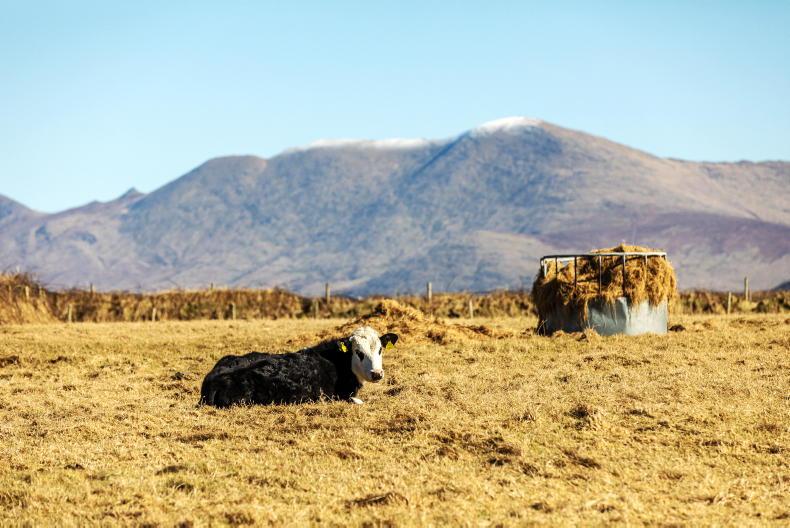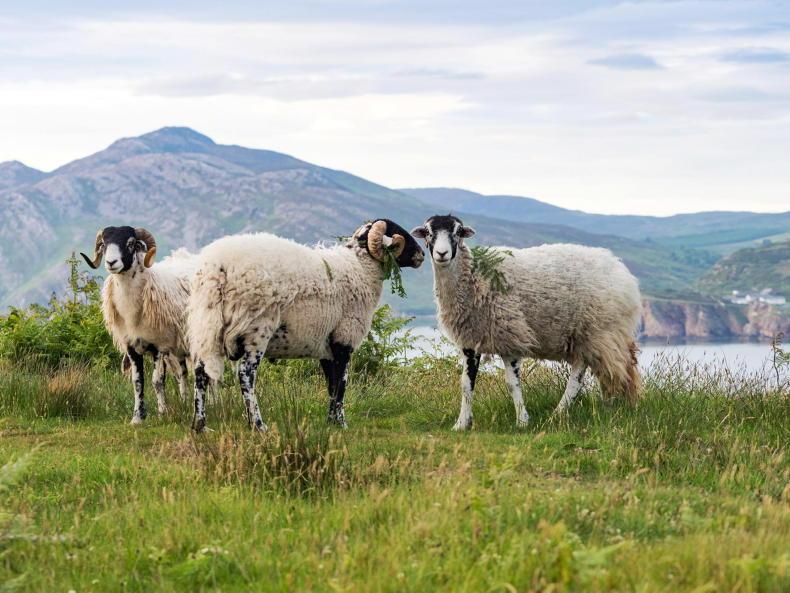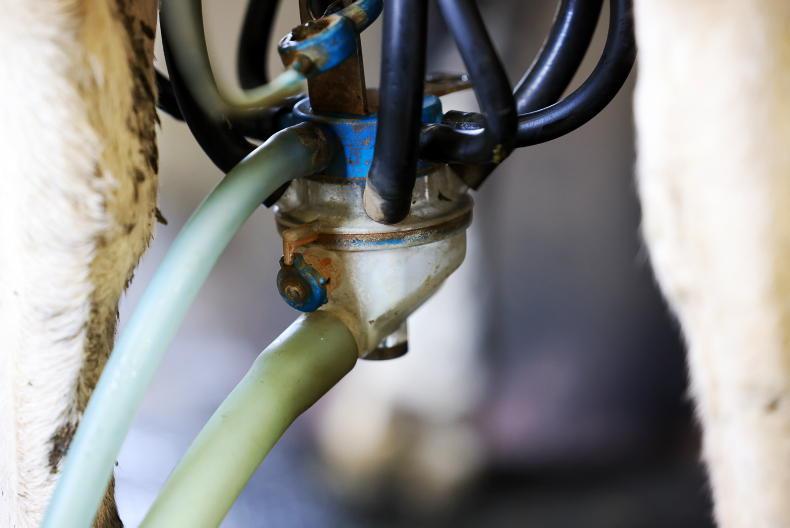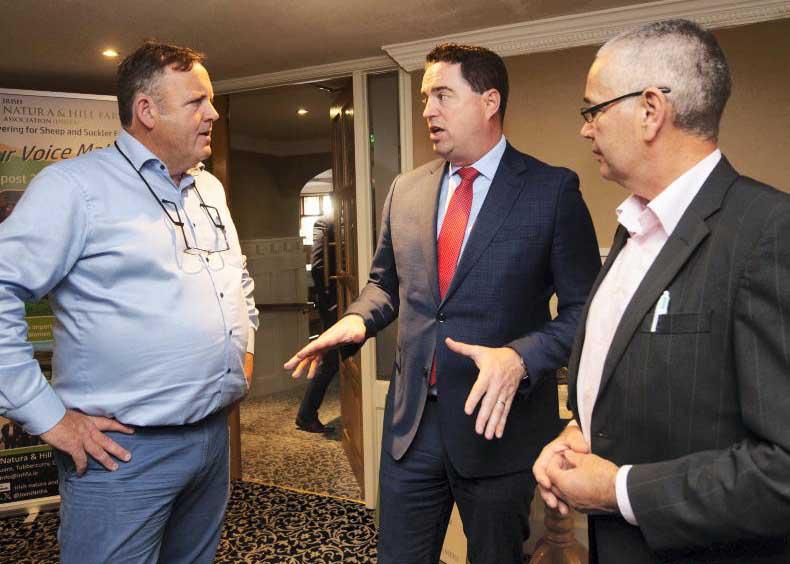Extensive farmers should not be subject to finger pointing that “borders on discrimination”, according to the Irish Natura and Hill Farmers Association (INHFA).
INHFA vice-president Micheal McDonnell said the mechanism of front loading within the new CAP will help “thousands of farmers and their families up and down the country”, who have their 150 to 200 ewes and 10 cows.
He highlighted that such extensive farmers “also pay their taxes and spend their money in the local shop” while “selling their stock in local marts and supporting their local co-op store”.
McDonnell described how these extensive systems “are making a major contribution to the food chain” by “supplying naturally-reared weanlings and store lambs while holding down off-farm employment as they strive to support their family farm”.
‘Productive’ farmers
The INHFA vice-president made his remarks following the Department’s CAP information meetings in Carlow and Wexford over the past fortnight, where farmers in the southeast who described themselves as “productive” said they have been “sold out” by Minister for Agriculture Charlie McConalogue under the new CAP.
Carlow farmer John Kehoe said that a farmer with 40 ewes on 100ac will “get everything you want to get” and said it was “very, very sore” that productive farmers are losing out. Laois farmer Henry Burns called for the new CAP to be postponed.
Redistributed
Department officials indicate that some €11m is to be redistributed from the southeast to those areas where farming is more extensive.
Rebutting the remarks of Kehoe and Burns, as reported by the Irish Farmers Journal, McDonnell said those who “still see CAP only in the context of food production” and who “point to the current war as justification for a review” do so “fraught with danger”.
“To change CAP policy at this late stage could undermine all payments from 2023,” he said.
Sustainable food systems
McDonnell said it was "time that Ireland as a country needs to acknowledge our sustainable food systems” in light of the impact of the war in Ukraine on fertiliser and feed supply.
He noted the setting up of the National Food and Fodder Security Committee to support farmers in mitigating this impact of the war.
It would be remiss of us to continue to ignore the elephant in the room
However, he added: “In dealing with this challenge, it would be remiss of us to continue to ignore the elephant in the room, that [Ireland has] a food production model that is heavily dependent on the importation of animal feed and fertiliser.
“While most people will point to the primary food processors and the suppliers of animal feed, fertiliser and other necessities, there is no doubt the biggest winners are the supermarkets and the consumer and the reason for this is the cheap food policy adopted by the EU and other western economies since the mid-1970s.”
The INHFA vice-president said that while this CAP policy has “worked well for governments and the public, it has driven specialisation over diversification because the returns are too low”.
“It has left us vulnerable in key areas, especially around grain production. It has left us dependent on imported fertilisers and animal feedstuff and, for farmers, has taken a heavy toll in terms of farm accidents and deaths,” he said.
Payback
Th Mayo mixed farmer described the new CAP plan as “payback” for this approach to food production.
He said that the CAP was “initially introduced to ensure a constant supply of food”, but “was later adopted to support farmers in the delivery of cheap food”.

Farmers with 100 ewes and 10 cows also contribute to the economy, says the INHFA. \ Philip Doyle
“More recently, when it was cheaper to bring food into the EU from other countries, CAP was once again adopted with a new focus on delivering for the environment,” he said.
McDonnell claimed the new CAP programme will “ensure more equity for all farmers” and said this has been the policy of the INHFA since its establishment in 2015.
He said: “With regard to the new CAP programme, we are going to see an increased focus around climate change and biodiversity loss, which will provide the opportunity to address legacy issues with regard to land designations.
“In finally recognising the public good provided through improved environmental outcomes, farmers on these lands will be in the position to receive a financial recognition for the public good they are providing.”
Increased budget
Michael McDonnell called for additional support for all farmers through an increased budget across both pillars.
He said: “In the short term, we can, through Pillar II, target these increased supports at specific sectors such as suckler, sheep, tillage and horticulture.
"In following this model, we can recognise the importance of food production while not coming into conflict with WTO agreements.
“What we need is to work with the CAP to ensure a better deal for all farmers and reassess our farming practices to reduce our reliance on imported grain and fertiliser,” he said.
Read more
Productive farmers 'sold out' by McConalogue in Carlow
Farmers left ‘disrespected’ by CAP in Wexford
Extensive farmers should not be subject to finger pointing that “borders on discrimination”, according to the Irish Natura and Hill Farmers Association (INHFA).
INHFA vice-president Micheal McDonnell said the mechanism of front loading within the new CAP will help “thousands of farmers and their families up and down the country”, who have their 150 to 200 ewes and 10 cows.
He highlighted that such extensive farmers “also pay their taxes and spend their money in the local shop” while “selling their stock in local marts and supporting their local co-op store”.
McDonnell described how these extensive systems “are making a major contribution to the food chain” by “supplying naturally-reared weanlings and store lambs while holding down off-farm employment as they strive to support their family farm”.
‘Productive’ farmers
The INHFA vice-president made his remarks following the Department’s CAP information meetings in Carlow and Wexford over the past fortnight, where farmers in the southeast who described themselves as “productive” said they have been “sold out” by Minister for Agriculture Charlie McConalogue under the new CAP.
Carlow farmer John Kehoe said that a farmer with 40 ewes on 100ac will “get everything you want to get” and said it was “very, very sore” that productive farmers are losing out. Laois farmer Henry Burns called for the new CAP to be postponed.
Redistributed
Department officials indicate that some €11m is to be redistributed from the southeast to those areas where farming is more extensive.
Rebutting the remarks of Kehoe and Burns, as reported by the Irish Farmers Journal, McDonnell said those who “still see CAP only in the context of food production” and who “point to the current war as justification for a review” do so “fraught with danger”.
“To change CAP policy at this late stage could undermine all payments from 2023,” he said.
Sustainable food systems
McDonnell said it was "time that Ireland as a country needs to acknowledge our sustainable food systems” in light of the impact of the war in Ukraine on fertiliser and feed supply.
He noted the setting up of the National Food and Fodder Security Committee to support farmers in mitigating this impact of the war.
It would be remiss of us to continue to ignore the elephant in the room
However, he added: “In dealing with this challenge, it would be remiss of us to continue to ignore the elephant in the room, that [Ireland has] a food production model that is heavily dependent on the importation of animal feed and fertiliser.
“While most people will point to the primary food processors and the suppliers of animal feed, fertiliser and other necessities, there is no doubt the biggest winners are the supermarkets and the consumer and the reason for this is the cheap food policy adopted by the EU and other western economies since the mid-1970s.”
The INHFA vice-president said that while this CAP policy has “worked well for governments and the public, it has driven specialisation over diversification because the returns are too low”.
“It has left us vulnerable in key areas, especially around grain production. It has left us dependent on imported fertilisers and animal feedstuff and, for farmers, has taken a heavy toll in terms of farm accidents and deaths,” he said.
Payback
Th Mayo mixed farmer described the new CAP plan as “payback” for this approach to food production.
He said that the CAP was “initially introduced to ensure a constant supply of food”, but “was later adopted to support farmers in the delivery of cheap food”.

Farmers with 100 ewes and 10 cows also contribute to the economy, says the INHFA. \ Philip Doyle
“More recently, when it was cheaper to bring food into the EU from other countries, CAP was once again adopted with a new focus on delivering for the environment,” he said.
McDonnell claimed the new CAP programme will “ensure more equity for all farmers” and said this has been the policy of the INHFA since its establishment in 2015.
He said: “With regard to the new CAP programme, we are going to see an increased focus around climate change and biodiversity loss, which will provide the opportunity to address legacy issues with regard to land designations.
“In finally recognising the public good provided through improved environmental outcomes, farmers on these lands will be in the position to receive a financial recognition for the public good they are providing.”
Increased budget
Michael McDonnell called for additional support for all farmers through an increased budget across both pillars.
He said: “In the short term, we can, through Pillar II, target these increased supports at specific sectors such as suckler, sheep, tillage and horticulture.
"In following this model, we can recognise the importance of food production while not coming into conflict with WTO agreements.
“What we need is to work with the CAP to ensure a better deal for all farmers and reassess our farming practices to reduce our reliance on imported grain and fertiliser,” he said.
Read more
Productive farmers 'sold out' by McConalogue in Carlow
Farmers left ‘disrespected’ by CAP in Wexford










SHARING OPTIONS